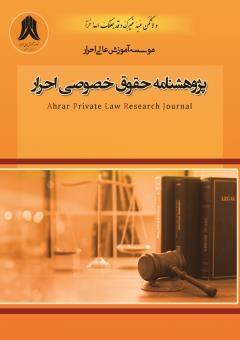مطالعه تطبیقی شناسایی و اجرای احکام خارجی در امور مدنی و تجاری در حقوق ایران و کنوانسیون لاهه ۱۹۷۱
محورهای موضوعی : حقوق بین المللاباست پورمحمد 1 , فائزه جهانی مقدم 2
1 - استادیار حقوق خصوصی،گروه حقوق، دانشکده علوم انسانی، واحد ارومیه ،دانشگاه آزاد اسلامی،ارومیه، ایران.
2 - دانشجو دکتری حقوق خصوصی،گروه حقوق، دانشکده علوم انسانی، واحد ارومیه ،دانشگاه آزاد اسلامی،ارومیه، ایران.
کلید واژه: کنوانسیون لاهه, احکام مدنی و تجاری, قوانین ایران. ,
چکیده مقاله :
در توسعه روابط بین الملل، شناسایی و اجرای احکام صادره از محاکم خارجی از اهمیت بالایی برخوردار است. در میان سازمان های بین المللی موجود در لاهه، کنوانسیون لاهه در زمینه حقوق بین الملل خصوصی منحصر به فرد است و از این میان، کنوانسیون 1971 لاهه نشان دهنده نقطه عطفی در تلاش های بین المللی برای ایجاد قوانین و اصول یکسان برای به رسمیت شناختن و اجرای احکام خارجی است. در قوانین ایران نیز، شرایط شناسایی و اجرای حکم در ماده ۱۶۹ قانون اجرای احکام مدنی تصریح شده است. در این مقاله سعی بر آن است تا با استفاده از روش کتابخانه ای و نیز روش توصیفی – تحلیلی، یک مطالعه تطبیقی در زمینه شناسایی و اجرای احکام خارجی در امور مدنی و تجاری با نگاهی بر مفاد کنوانسیون لاهه ۱۹۷۱ و نیز قوانین مدنی ایران صورت پذیرد.
In the development of international relations, the identification and implementation of judgments issued by foreign courts are of great importance. Among the international organizations in The Hague, the Hague Convention is unique in the field of private international law, and among them, the 1971 Hague Convention represents a turning point in international efforts to create uniform laws and principles for recognizing and enforcing foreign judgments. In Iranian laws, the conditions for identifying and enforcing judgments are also stated in Article 169 of the Civil Procedure Code. In this article, a comparative study is attempted using library research method and descriptive-analytical approach on the identification and implementation of foreign judgments in civil and commercial matters with a focus on the provisions of the 1971 Hague Convention and Iranian civil laws.
1.Almasi, Najad, A. (2004). Conflict of Laws, Tehran, University Press Center, 11th Edition. [In Persian]
2. Batiffol, H & L, Paul (1983). Droit international Prive. 7eme. Ed., Paris, Libraire generale de droit ET de Jurisprudence.
3. Hague Conference on Private International Law, Actes et documents de la Session extraordinaire (1966), Exécution des jugements (514 pp.).
4. Jalali, M, and Nourian, A. (2020). A Comparative Study of the General Conditions for the Recognition and Enforcement of Foreign Judgments in Iranian and European Union Law. Journal of Public Law Studies, Volume 50, Number 2, Pages 771-792. [In Persian]
5. Katouzian, A. (2000). Civil Law in the Current Legal Order, Tehran: Dadgostar, Fourth Edition. [In Persian]
6. Kashiarayi, R. (2011). The Conditions for the Enforcement of Foreign Judgments Based on the Validity of the Decree, Tehran: Tehran University Publications, Number 18. [In Persian]
7. OJ 2007, L 339/3, https://eur-lex.europa.eu/legal-content/EN/TXT/PDF/?uri=CELEX:22007A1221(03) &from=EN.
8.OJ 2012, L 351/1, https://eur-lex.europa.eu/LexUriServ/LexUriServ.do?uri=OJ:L:2012:351:0001:0032:En: PDF, as modified by Regulation 542/2014 and Regulation 2015/281.
9. Teitz, L.E., .(2019).Another Hague Judgments Convention? Bucking the Past to Provide for the Future’, Duke Journal of Comparative & International Law (29) . pp. 491-511, https://scholarship.law.duke.edu/djcil/vol29/iss3/7.
10.Safaei, S H. (2003). Preliminary Course of Civil Law, Volume 2, Tehran: Mizan. [In Persian]
11.https://www.hcch.net/en/states/hcch-members
12.https://assets.hcch.net/docs/bacf7323-9337-48df-9b9a-ef33e62b43be.pdf
13. https://www.hcch.net/en/instruments/conventions/full-text/?cid=34.
14. https://www.hcch.net/en/instruments/conventions/full-text/?cid=38.
15. https://www.hcch.net/en/instruments/conventions/full-text/?cid=77.
16. https://www.hcch.net/en/instruments/conventions/full-text/?cid=78, with explanatory report by Ch. Fragistas
17.https://www.hcch.net/en/instruments/conventions/full-text/?cid=79, with explanatory report by G. Droz.


